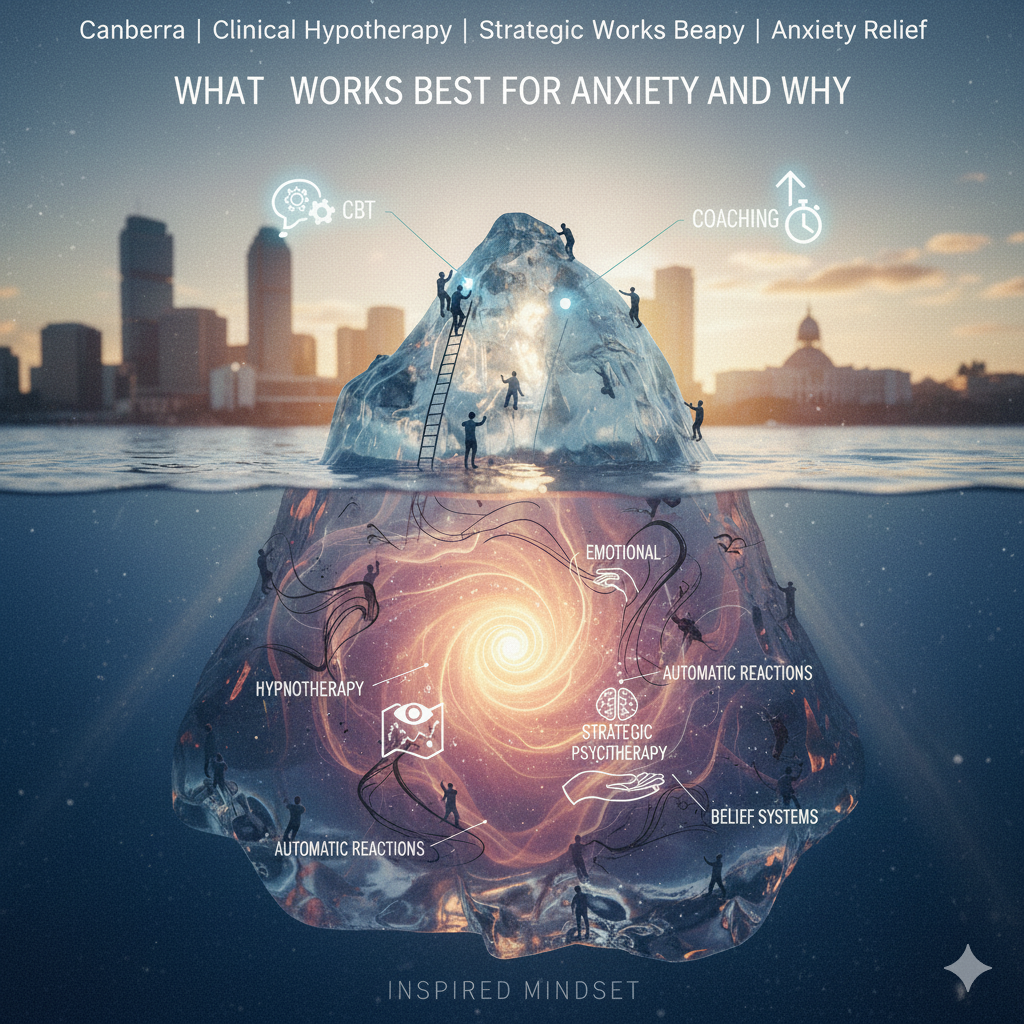Hypnotherapy: Does It Work?
Imagine finally breaking free from a stubborn habit or fear that’s been holding you back for years. Perhaps you’ve tried to quit smoking time and again, or you feel trapped by anxiety that won’t relent.
In the search for solutions, hypnotherapy often comes up – and with it, the question: Does hypnosis really work, or is it just stage-show trickery? This modern therapeutic technique has sparked both curiosity and scepticism. Yet behind the Hollywood myths of dangling pocket watches lies a growing body of evidence and success stories.
In this blog, we’ll explore whether hypnotherapy truly works and what psychologists say about it. We’ll look at the success rates and scientific evidence for hypnosis, especially in areas like quitting smoking, losing weight, overcoming addictions, and managing anxiety or depression. By the end, you’ll have a clear, informed (and hopefully excited) perspective on the power of hypnotherapy to change lives.
What Is Hypnotherapy and How Does It Work?
Hypnotherapy is a guided therapeutic process that uses clinical hypnosis – a focused, trance-like state of deep relaxation and heightened concentration – to help people make positive changes. For many, it offers a form of alternative medical treatment that supports mental clarity and emotional balance
Canberra hypnotherapy clients often describe it as a calming, empowering experience. Despite dramatic portrayals in movies, hypnosis is not mind control or magic. In fact, during a hypnosis session you remain fully aware and in control of your actions; you’re simply extremely relaxed and open to suggestion. This state is something like being so absorbed in a book or movie that the outside world fades away – your attention narrows and your imagination becomes more vivid.

Under the guidance of a certified hypnotherapist, you enter this relaxed state and focus inward. The therapist then introduces positive suggesti
ons and mental imagery tailored to your goals – for example, reinforcing your desire to quit smoking or reducing the fear associated with a phobia
In this trance or hypnotic state, these suggestions can sink in deeply, helping to “rewire” thought patterns or habits that are hard to change in normal waking life. One psychologist describes hypnosis as “creating a mindset where someone is so absorbed that they can change or transcend their perceptions of pain, shift their attention away from the rumination that fuels depression, or the fear that fuels anxiety”. In other words, hypnotherapy helps you use your subconscious mind as an ally in healing and self-improvement.
It’s important to dispel a few myths: you cannot be hypnotised into doing anything against your will or values. You won’t cluck like a chicken unless you genuinely want to! Stage hypnosis relies on peer pressure and willing volunteers, whereas clinical hypnotherapy is a professional collaboration aimed at real results
In a legitimate hypnotherapy session, you are an active participant in your own change. As long as you’re open to the process, hypnosis can tap into your natural abilities – like creativity, imagery, and focus – to help you overcome challenges that might feel insurmountable in a normal state of mind.
Does Hypnosis Really Work?
A Shift in Perspective
The short answer is yes – hypnotherapy can work, often powerfully so. In decades past, clinical hypnosis was viewed by some as fringe or lacking scientific support. But times have changed. With decades of data and new research supporting its effectiveness, practitioners are embracing hypnosis to treat certain conditions, including mental health conditions, chronic pain, and even irritable bowel syndrome
Hypnosis has in fact been used therapeutically for a long time (even dating back to the 18th-century work of Franz Mesmer, from whom we get the word “mesmerise”). Today, we have a much clearer picture of what clinical hypnosis can and cannot do.
The Science Behind Hypnosis Therapy
Scientific research and clinical evidence confirm that hypnotherapy can bring real, measurable benefits. For example, brain imaging studies show that when a person is hypnotised, their brain reacts differently – as if it’s experiencing what’s being imagined as real. In one study, hypnotised volunteers asked to imagine pleasant memories showed activation in the sensory parts of the brain, just as if they were truly living those moment.
Clinical hypnosis can also dampen activity in areas of the brain that register pain, which explains why people under hypnosis can tolerate pain better. In clinical settings, hypnotherapy has been successfully used as a form of anesthesia during certain surgeries and dental procedures – patients remain comfortable with little or no chemical sedation, which is remarkable evidence that the mind can alter physical pain responses.
Real-World Results and Personal Change
Beyond laboratory studies, countless personal stories attest to hypnotherapy’s effectiveness. People have used hypnosis therapy to overcome public speaking fears, manage cancer treatment side effects, enhance athletic or artistic performance, and even improve their focus at work or school. If this all sounds extraordinary, it’s because hypnotherapy taps into an extraordinary asset: your own mind. Under hypnosis, you can access a state of hyper-focus and suggestibility where positive change happens more easily.
One researcher noted that hypnosis can “kick-start the process by making it easier to change,” essentially bypassing the mental resistance that often blocks us in everyday life. Far from being a party trick, hypnosis is a respected therapeutic technique – so much so that the American Psychological Association endorses its benefits for issues like pain, anxiety, mood disorders, and habit control.
It’s Not a Miracle – But It Can Feel Like One
Of course, like any treatment, hypnotherapy isn’t a one-size-fits-all magic cure. Its success can depend on the skill of the therapist, the problem being addressed, and the individual client’s openness and personality. Some people are naturally more hypnotizable than others (much like some people are more responsive to meditation or visualisation). However, studies indicate that most people can be hypnotised to a meaningful degree if they are willing.
And when it works, it can feel almost effortless – smokers report losing the urge to smoke without the usual agony of withdrawal, and those with chronic pain often experience significant relief through hypnotic techniques.
In the following sections, we’ll dive into what psychologists think of hypnotherapy and look at specific success rates and evidence from research. Spoiler: it’s encouraging stuff for anyone considering this route.

What Do Psychologists Think of Hypnotherapy?
From Skepticism to Acceptance
Psychologists and medical professionals today largely view hypnotherapy as a valid and valuable therapeutic tool – when practised by qualified individuals. There was a time when hypnosis carried a bit of a mystical stigma, which made some practitioners hesitant. However, as one APA (American Psychological Association) expert put it, “Over the past few decades, there have been tremendous advances in understanding hypnosis and its benefit for research and practice.”
Hypnosis now has clear benefits in psychotherapy, improving outcomes in areas such as pain management, anxiety, depression, sleep, and more.
Hypnosis in Mainstream Psychological Practice
In fact, the APA has a division (Society of Psychological Hypnosis) dedicated to the study and application of hypnosis. It’s no longer considered a fringe treatment at all – it’s taught and practised within mainstream psychology and healthcare.
Many psychologists integrate hypnotherapy with other approaches like cognitive-behavioural therapy. They find that hypnosis can accelerate progress by helping clients focus intensely and bypass mental blocks.
For instance, a therapist might use traditional talk therapy to challenge a client’s negative thoughts, then use hypnosis to reinforce new positive beliefs at a deeper subconscious level. Research bears this out: combined treatments (like CBT plus hypnotherapy) often outperform therapy alone, especially for conditions such as anxiety and phobias.
A Trusted Complement in Mental Health Care
Not all psychologists use hypnosis, but those who do tend to be strong advocates for its efficacy. Dr. Michael Yapko, a renowned clinical psychologist and hypnosis expert, notes that hypnosis is essentially a way of delivering therapy in a focused, amplified manner. Under hypnosis, clients can become “more focused, more engaged, more responsive and more empowered” to tackle. Many mental health professionals appreciate that hypnotherapy is low-risk and medication-free – a complement to other treatments that can enhance outcomes without side effects.
The general consensus in the psychological community is that hypnotherapy can be very effective for a range of problems, particularly when administered by a trained therapist and tailored to the client’s needs. It’s not mind control or a placebo; it’s a bona fide therapeutic technique with a growing scientific evidence base.
As long as someone seeks out a qualified practitioner (for example, in Australia, look for professionals registered with groups like the Australian Hypnotherapists Association or who have recognised training), they can feel confident that hypnotherapy is a credible option worth considering.
Success Rates and Scientific Evidence of Hypnotherapy
So, what is the success rate of hypnotherapy for real-world issues? While results naturally vary case by case, there is compelling data showing hypnotherapy’s effectiveness. Let’s break down some of the evidence by specific challenges:
Quitting Smoking with Hypnotherapy
Why Hypnotherapy Works for Smoking
Smoking cessation is one of the most famous applications of hypnotherapy – and for good reason. Cigarettes intertwine physical addiction with habits and emotional triggers, which makes quitting notoriously hard.
Hypnotherapy tackles the mental and behavioural side of this addiction, and studies have found it can significantly boost people’s success in quitting. In fact, the largest ever scientific comparison of smoking cessation methods (covering over 70,000 smokers) found that hypnosis was the most effective method overall.
On average, clinical hypnosis was more than 3 times as effective as nicotine replacement therapy (like the patch), and 15 times as effective as trying to quit “cold turkey” (willpower alone). That’s a striking advantage.
Success Rates Backed by Research
Individual clinical studies echo this success. Researchers at the University of Washington School of Medicine reported a 90.6% success rate for patients who used a specific hypnotherapy protocol to quit smoking. In that study, 39 out of 43 smokers remained abstinent from tobacco when followed up 6 months to 3 years later – a phenomenal outcome.
Another field study found that 87% of participants remained smoke-free at 3 months after hypnosis-based treatment. Even in studies where hypnosis isn’t a runaway winner, it holds its own: a 2019 systematic review of 14 trials concluded that hypnotherapy was as effective as standard behavioural counselling at the 6-month mark.
In other words, adding clinical hypnosis can achieve results comparable to well-established quit-smoking programs – and some data suggests it could help certain people much more.
A Gentle Yet Powerful Approach
If those numbers sound high, it’s worth noting that not everyone will walk away 100% cured by a single hypnosis session. Quitting smoking is often a journey, and some studies with more modest results exist. (For example, one review of self-hypnosis for smoking found about a 20–35% six-month abstinence rate – still encouraging, given how addictive nicotine is.)
However, even conservative research indicates hypnosis can double or triple the chances of success compared to going it alone. And importantly, hypnotherapy tends to make quitting feel easier.
Instead of fighting white-knuckled against cravings, smokers under hypnosis often report that cigarettes suddenly seem unappealing or that the urge simply melts away. The hypnotherapist might implant suggestions like “you have the power to control smoking, it doesn’t control you,” or create a mental aversion to the taste and smell of smoke. These suggestions take root in the subconscious, where much of our behaviour is governed.
As a result, clients frequently find they can quit without the usual stress, weight gain, or irritability – a huge win for their health and confidence.
Weight Loss and Healthy Habits
Shifting the Mindset Behind Eating
For those battling with weight loss or unhealthy eating, hypnotherapy offers more than just another diet – it helps shift the mindset behind eating habits. Diets often fail because they focus on the surface (what you eat), not the deeper reasons (why you eat).
Hypnosis works on the subconscious, addressing emotional triggers, stress, or negative self-image. Research backs it up. A University of Connecticut meta-analysis found people using clinical hypnosis in weight loss programs lost more weight than 90% of those who didn’t.
Even better, they continued losing or keeping weight off two years later, unlike others who regained. Another review showed that hypnosis more than doubled the weight loss in behavioural treatments. These results suggest hypnotherapy supports real, long-term change.
How Hypnosis Therapy Supports Lasting Change
In practice, clients might visualise being at a healthier weight, feel fuller sooner, or lose interest in junk food.
Guided imagery can reshape how they respond to hunger, cravings, and portion sizes. More than numbers on a scale, people often report feeling more confident, motivated, and free from emotional eating. By targeting the stress or low self-worth often tied to weight issues, hypnotherapy helps break the cycle of temporary success followed by relapse. Healthy habits begin to feel natural rather than forced.
It’s not a miracle cure, but it can flip an inner switch – replacing struggle with a calm, steady sense of control. For many, that makes all the difference.
Breaking Free from Addictions and Bad Habits
Tackling the Root of Addictive Patterns
Addictions aren’t limited to smoking – they include alcohol, gambling, drugs, nail-biting, even procrastination. Hypnotherapy can support recovery by working at the subconscious level, where cravings and patterns often begin.
It’s not a standalone fix, but when paired with counselling or group support, it can boost motivation, reduce relapse risk, and help shift internal narratives. In Australia, professional bodies like the Australian Hypnotherapists Association recognise its effectiveness in addiction support.
Under hypnosis, people can reframe their attachment to a substance or behaviour, visualise their body healing, or symbolically release the grip of addiction. It also provides a path to process deeper issues like trauma or anxiety, which often sit behind the behaviour.
A Mind-Based Approach to Long-Term Recovery
Research supports its benefits. A 2019 study showed a six-week hypnosis program rivalled motivational therapy in helping long-term alcohol users cut back. People also learn self-hypnosis – a mental tool to manage cravings and visualise success.
These techniques can become part of daily life, strengthening self-control. Hypnotherapy doesn’t lecture or shame. It creates a space where change feels achievable and empowering.
Many describe it as the turning point that helped them shift from feeling trapped to feeling capable. Whether the struggle is alcohol, gambling, or something smaller but stubborn, hypnotherapy can help people tap into their inner strength and move forward – with calm, confidence, and support.
Easing Anxiety and Stress
Breaking the Cycle of Fear and Tension
Life today is stressful, and anxiety disorders are among the most common reasons people seek therapy. Hypnotherapy has a well-established track record in relieving anxiety, stress, and even phobias. It makes sense: anxiety often involves a cycle of fearful thoughts and physical tension, and hypnosis directly counteracts both by inducing deep relaxation and planting calmer thought patterns.
Psychologists have found that combining clinical hypnosis with cognitive-behavioural therapy can significantly improve outcomes for anxiety disorders. In practice, hypnotherapy for anxiety might include techniques like guided imagery (for example, visualising a “safe place” or successful handling of a feared situation) and post-hypnotic suggestions that promote confidence and tranquillity.
Building Calm and Control from Within
What’s remarkable is how quickly hypnosis can dial down the body’s stress response. Just learning to enter a hypnotic state can give anxious clients a sense of control they haven’t felt in a long time. Instead of anxiety controlling them, they now have a mental tool to find calm on demand.
Research on specific phobias and panic also shows promise. Because hypnosis can temporarily dissociate a person from their habitual fear response, it allows them to reprogram their reactions in a safe environment. A person with a flying phobia, for instance, can be guided under hypnosis to imagine boarding a plane calmly, and their mind can practice that response without the usual terror. Over a few sessions, this can greatly reduce the actual fear when flying for real.
A Research-Backed Solution for Modern Stress
There’s scientific support for these effects. A meta-analysis of hypnosis for anxiety concluded that hypnosis is effective at reducing anxiety, especially when combined with other therapeutic techniques. Another study found that cancer patients using hypnosis reported less anxiety and better emotional adjustment than those receiving just educational support.
From test anxiety in students to stress management in high-pressure jobs, hypnotherapy offers tools to cope. Importantly, clinical hypnosis often addresses anxiety at its roots: it can help uncover subconscious triggers of worry, challenge irrational fears, and bolster one’s resilience by instilling positive affirmations (“You are safe,” “You can handle this,” etc.) at a deep level.
For anyone whose mind is constantly stuck on overdrive, hypnotherapy can feel like hitting the “reset” button – releasing that constant tension and replacing it with a newfound sense of calm.
Overcoming Depression and Improving Mood
Addressing Depression Through the Subconscious Mind
Hypnotherapy can be a valuable part of treating depression, especially when combined with other therapies. Depression often clouds thinking, drains motivation, and fuels a sense of hopelessness. Hypnosis helps by working directly with the subconscious mind – where deep beliefs and emotional patterns are stored.
During hypnotherapy, clients might be guided to visualise letting go of emotional burdens, connecting with positive memories, or imagining a future where they feel strong again. These visualisations aren’t just pleasant ideas. Under hypnosis, the mind can accept them as possible, and even begin to feel their emotional impact. This creates space for hope, compassion, and healing to take root. Studies show that combining hypnosis with therapies like CBT can make treatment more effective, helping people adopt healthier thought patterns more quickly.
Clinical hypnosis also helps improve sleep, reduce rumination, and support better self-care – all crucial in breaking depression’s cycle.
A Supportive Path to Renewed Energy and Hope
While hypnotherapy isn’t a stand-alone treatment for severe depression, it’s a powerful complementary tool. Always consult a medical professional and follow any prescribed treatment plan. But hypnotherapy can support recovery by reducing emotional weight, building inner strength, and helping people reconnect with who they are beyond the depression. Many describe it as lifting a fog, restoring confidence, or simply feeling more like themselves again.
Even small shifts – sleeping better, feeling calmer, or having more energy – can spark motivation and bring clarity. These gentle but meaningful changes often start a positive chain reaction. In our experience, once that inner spark is lit, clients begin to see they’re not powerless. They can move forward, one step at a time, and hypnotherapy helps guide that process with empathy, focus, and emotional depth.
Why Clinical Hypnosis Works: A Look at the Science
Modern research into clinical and experimental hypnosis continues to uncover how this approach enhances the outcomes of psychological treatments and other psychological interventions. At its core, hypnosis involves focused attention and deep mental absorption – creating an altered state where the mind becomes more receptive to therapeutic suggestions. This process engages specific brain regions associated with memory, perception, and emotional regulation, helping to shift thought patterns that may be contributing to distress or dysfunctional habits. As part of integrative medicine, hypnosis is increasingly being recognised not only for its calming effect but also for its ability to complement mainstream approaches in areas such as anxiety, depression, and trauma recovery.
Importantly, while hypnosis appears simple on the surface, it should only be used in clinical contexts by qualified health professionals. Those trained to perform hypnosis can guide clients safely through the process, using targeted suggestions to support behaviour change or symptom relief. It has shown particular promise in managing pain, offering a drug-free way to reduce discomfort in both acute and chronic conditions. As the body of evidence grows, hypnosis is being seen less as a fringe method and more as a valuable clinical tool that bridges the gap between mind and body – empowering clients with a renewed sense of control over their wellbeing.
Embracing the Power of Hypnotherapy
Hypnotherapy has moved far beyond old misconceptions. It now stands as a credible, professionally supported method for helping people quit smoking, overcome anxiety, manage trauma, and shift self-defeating behaviours.
Rather than relying on willpower alone, hypnotherapy taps into the mind’s natural focus and suggestibility to spark real change. It isn’t instant or universal, but many find lasting results – from breaking habits to easing chronic pain without medication. Scientific backing is strong, yet the most powerful evidence often lies in personal stories. If you’re weighing up the option, it’s normal to feel hopeful yet unsure. But with a trained hypnotherapist, the process is safe, deeply engaging, and often life-changing.
In Australia, therapists follow professional standards, and many – like us – have helped clients achieve remarkable outcomes. Hypnotherapy may not be magic, but for those open to the process, it can be the key to a healthier, more empowered future.
You're welcome to visit Inspired Mindset Hypnotherapy at our Canberra clinic for a personalised, in-person session. If you're located elsewhere or prefer the comfort of home, we also offer convenient online hypnotherapy sessions to support you wherever you are. To find out if hypnotherapy is right for you, feel free to book a free consultation – we're here to help you take the first step.




















